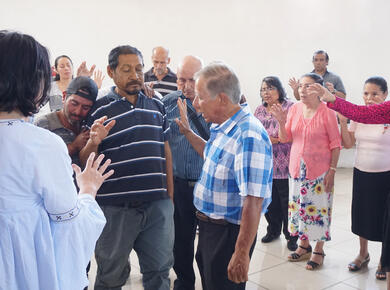Posted: December 5, 2023
Some years ago, in my local congregation in Colombia, a friend said to me: “Oh! César, how I envy you!” Why? I asked her. “I work in a multinational company. I deal with a lot of stress because of ongoing conflicts and broken relationships with my colleagues and bosses. But you, César, you work with pastors and leaders of churches. What kind of conflicts could you have?”
We know conflicts among leaders, polarization and divisions are part of all churches – local, regional, national or global. Broken relationships because of disagreements seem to be the only option when differences are irreconcilable. However, I wonder if it has to be that way.
How the church handles conflicts ought to be a mark of an alternative community. The church is the community that can show the world that handling conflict without division or broken relationships is possible.
But as Anabaptists, we know that that has not been our case historically.
Some months ago, I was reading an article in a Mennonite magazine. Its author said: “I am proud of leaving this church because that is the faithful thing to do. You know, when you have to sacrifice doctrine or ethics, you must leave.”
Of course, that is a dilemma if you have to decide between unity on one hand or doctrine or ethics on the other. Is it necessary to sacrifice unity to keep a healthy doctrine or good ethics? That is how we have dealt with doctrinal and ethical conflicts in our Anabaptist history. Our experience of ongoing fragmentation has taken us to spiritualize unity or to leave it for the afterlife.
However, the New Testament speaks about the unity of Jesus’ followers as a gift of the Holy Spirit to be received, enjoyed and kept here and now (see, for example, the book of Ephesians).
Speaking of unity implies the existence of differences and disagreements.
I do believe unity and disagreements are not opposites. In my own life, I experience contradictions. Today, I can’t entirely agree with everything I have taught before during my 30 years of ministry. Thanks to God, I can say that I have been growing in my spiritual life and walking following Jesus.
“Do not be conformed to this age, but be transformed by the renewing of the mind, so that you may discern what is the will of God – what is good and acceptable and perfect,” says the apostle Paul (Romans 12:2). Renewing implies change, transformation and some internal contradiction with what I believed, did or was before.
If disagreements and contradictions are part of Christ’s body, conflicts are, too. That may be one reason why disagreements, teachings about forgiveness and conflict resolution among disciples are common topics throughout the New Testament.
The problem, then, does not have to do with the existence of conflicts but how we deal with them.
Broken relationships and divisions do not have to be the result of a conflict. If there is a robust and irreconcilable disagreement among Jesus’ disciples, condemning or excommunicating each other is not the only option. Why would we think our brother or sister in Christ is not an honest Christian because they do not coincide with our current way of thinking or with our group?
Strong disagreements may push us to distance – for some time – from each other. Irreconciled positions may make it too difficult to work together. But that does not mean we must question the commitment to Jesus of those who disagree with us. Can we say: “I strongly disagree with you but still respect your commitment to Christ”? Can we create distance with other believers without condemning them and breaking the relationship?
Those are some of the questions we want to address in this issue of Courier. May God guide us to find biblical answers that help us show the world what is different when we address conflict as members of an alternative community and in the power of the Holy Spirit. May God help us renew our minds about responding to church conflicts.
—César García is general secretary of Mennonite World Conference. Originally from Colombia, he lives in Kitchener, Ontario, Canada.




Join the Conversation on Social Media
FacebookTwitterInstagramFlickrYouTube